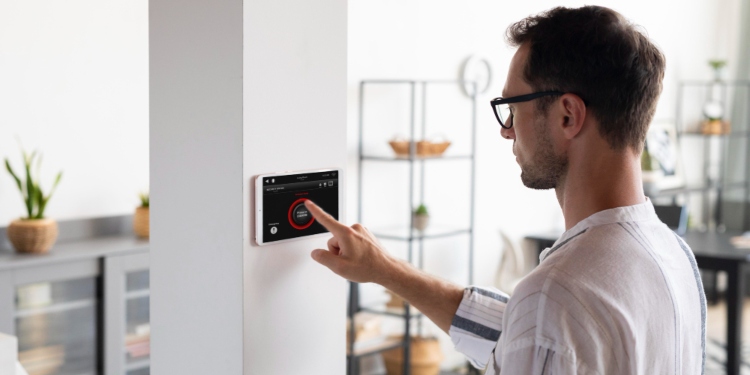Homeowners are increasingly aware of the importance of energy efficiency and indoor air quality, leading to the rise in popularity of smart ventilation systems. These advanced systems enhance the air inside your home, improve comfort, and help reduce energy costs. Let’s explore the specific benefits of investing in a smart ventilation system for your home.
Enhanced Air Quality
One of the primary advantages of a smart ventilation system is its ability to significantly improve indoor air quality. Traditional ventilation systems operate on a fixed schedule and do not adjust to the actual air quality inside your home.
In contrast, ventilation systems use sensors to detect pollutants, humidity, and CO2 levels, adjusting airflow in real time. This means that air is only circulated when necessary, ensuring that indoor air is fresh, clean, and healthy.
Indoor activities such as cooking, cleaning, or even having pets can impact your home’s air quality. Ventilation systems continually monitor the air for any degradation caused by these activities and respond by increasing ventilation to clear out odors and pollutants quickly.
This feature is particularly useful for maintaining a pleasant and fresh environment inside your home without the constant need to open windows, which can be inefficient or impractical during extreme weather.
Energy Efficiency
Smart ventilation systems are designed to optimize energy usage. By integrating with your home’s heating and cooling systems, they can reduce the need for constant heating or cooling.
For example, during cooler months, a smart system can recuperate heat from the outgoing air and use it to warm incoming fresh air. This heat recovery process minimizes the energy required to heat your home, leading to lower utility bills.
Comfort Control
Comfort in your home is deeply influenced by the quality of the air you breathe. Smart ventilation systems excel in maintaining optimal indoor conditions, ensuring your home is always a sanctuary of comfort. These systems respond dynamically to changes in indoor air, such as fluctuations in humidity, temperature, and air quality.
Adaptive Humidity Management
Smart ventilation systems are equipped with sensors that detect changes in indoor humidity levels. Excessive humidity can lead to discomfort, mold growth, and damage to your home’s structure and furnishings.
These systems can automatically adjust the airflow to reduce humidity during hot, muggy weather, ensuring your home remains comfortable and dry. Conversely, in drier months, the system can help maintain enough moisture in the air to prevent issues like dry skin and respiratory discomfort.
Temperature Consistency
Traditional HVAC systems can create zones of differing temperatures throughout a home, which can be particularly uncomfortable. Smart ventilation systems work in tandem with your heating and cooling systems to evenly distribute air. This not only prevents hot or cold spots but also makes sure that every room maintains a consistent, comfortable temperature.
Convenience and Connectivity
Smart ventilation systems can be easily controlled via smartphones or other smart home devices. This connectivity allows you to adjust settings on-the-go and receive real-time updates about the air quality in your home. For instance, if you’re coming home from a trip, you can activate the system remotely to ensure you return to a fresh environment.
Long-Term Health Benefits
The long-term health benefits of a smart ventilation system cannot be overstated. By consistently maintaining good air quality in your home, these systems can help reduce the risk of respiratory problems, allergies, and other health issues related to poor air quality. Particularly for families with children or elderly members, ensuring a constant supply of fresh air is crucial for good health.
Conclusion
Investing in a smart ventilation system for your home is a wise decision that pays off in multiple ways. Not only does it improve indoor air quality and enhance comfort, but it also reduces energy costs and connects seamlessly with other smart home technologies.
With the ability to adjust to your home’s unique environment, a smart ventilation system provides a tailored solution that traditional systems simply cannot match. By choosing a smart ventilation system, you’re not just upgrading your home; you’re investing in a healthier, more efficient, and more comfortable living environment.
David Prior
David Prior is the editor of Today News, responsible for the overall editorial strategy. He is an NCTJ-qualified journalist with over 20 years’ experience, and is also editor of the award-winning hyperlocal news title Altrincham Today. His LinkedIn profile is here.


![7 Best POS Software in the UK [2026 Edition]](https://todaynews.co.uk/wp-content/uploads/2026/02/7-Best-POS-Software-in-the-UK-2026-Edition-360x180.png)





















































![7 Best POS Software in the UK [2026 Edition]](https://todaynews.co.uk/wp-content/uploads/2026/02/7-Best-POS-Software-in-the-UK-2026-Edition-120x86.png)

![7 Best POS Software in the UK [2026 Edition]](https://todaynews.co.uk/wp-content/uploads/2026/02/7-Best-POS-Software-in-the-UK-2026-Edition-350x250.png)

















